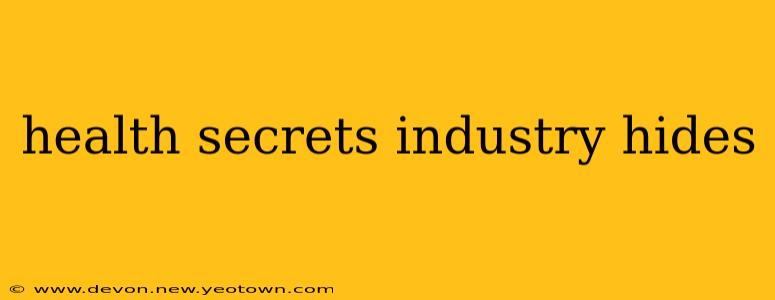The Health Secrets the Industry Doesn't Want You to Know: A Journey to Wellness Beyond the Hype
The health and wellness industry is a multi-billion dollar behemoth. It promises us the fountain of youth, the perfect body, and effortless vitality. But amidst the dazzling array of miracle cures and expensive supplements, some crucial truths often get buried. This isn't about conspiracy theories; it's about understanding the realities of health, often obscured by marketing and profit motives. Let's peel back the curtain and explore some of the secrets the industry might prefer you didn't know.
Why is the industry hiding these secrets? It's not a malicious plot; rather, it's a complex interplay of factors. Profit margins are high in the health industry, incentivizing the promotion of products over holistic lifestyle changes. Additionally, many health claims lack the rigorous scientific backing needed to truly validate their efficacy, yet still find their way into marketing campaigns.
What are the most effective ways to improve my health without spending a fortune?
This is perhaps the most crucial question, and one the industry often sidesteps. The truth is, some of the most effective health improvements are free or very inexpensive. Think about it: the most impactful changes are often lifestyle-based.
-
Prioritize Sleep: A consistent 7-9 hours of quality sleep is arguably the most impactful, free health intervention you can implement. It repairs your body, boosts your immune system, and improves your mood. Investing in a comfortable pillow or darkening your bedroom are small, inexpensive steps to significantly improve your sleep hygiene.
-
Move Your Body: Regular exercise doesn't require a pricey gym membership. Daily walks, dancing, cycling, or even home workouts using your bodyweight are incredibly effective and readily accessible.
-
Hydrate Consistently: Water is free, yet many people are chronically dehydrated. Carrying a reusable water bottle and sipping water throughout the day can make a significant difference in energy levels, skin health, and overall bodily function.
-
Nourish Your Body: Focus on whole, unprocessed foods. Cook more meals at home, emphasizing fruits, vegetables, lean protein, and whole grains. This significantly reduces your reliance on expensive processed foods often laden with unhealthy additives.
Are there hidden dangers in common health products?
Yes, absolutely. While many products are safe and effective, others contain ingredients with potential side effects not clearly communicated on the label. Additionally, some products may make unsubstantiated claims, promising results that simply aren't supported by scientific evidence. Always read labels carefully, research ingredients, and consult with a healthcare professional before starting any new supplement regimen.
What are some common myths perpetuated by the health industry?
The industry thrives on hype. Here are a few myths to watch out for:
-
The "One-Size-Fits-All" Approach: Health isn't a one-size-fits-all solution. What works for one person may not work for another. Personalization is key, and ignoring individual needs can be detrimental.
-
The Quick Fix Mentality: Real, sustainable health improvements take time and consistent effort. Products promising rapid weight loss or overnight transformations are often misleading and may even be harmful.
-
The "Detox" Fad: Your liver and kidneys are perfectly capable of detoxification. Expensive detox teas and cleanses are largely unnecessary and often contain ingredients with potential adverse effects.
What are some reliable sources of health information?
This is crucial. Seek information from reputable sources like the National Institutes of Health (NIH), the Centers for Disease Control and Prevention (CDC), and peer-reviewed scientific journals. Consult with qualified healthcare professionals, such as doctors, registered dietitians, and physical therapists, for personalized guidance.
In conclusion, navigating the health and wellness industry requires discernment. While many products and services offer genuine benefits, it's vital to be aware of the potential pitfalls. By prioritizing lifestyle changes, seeking reliable information, and consulting with healthcare professionals, you can take control of your health and well-being without falling prey to misleading marketing tactics. Remember, true health is a journey, not a destination, and it's one best traveled with knowledge and informed choices.

